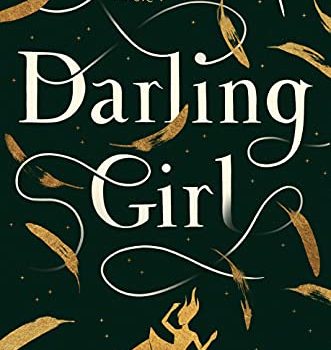Caren Gussoff Sumption Reviews Darling Girl by Liz Michalski
 Darling Girl, Liz Michalski (Dutton 978-0-593-18563-6, $26, 352pp, hc) May 2022
Darling Girl, Liz Michalski (Dutton 978-0-593-18563-6, $26, 352pp, hc) May 2022
I have a confession: I’ve always been a bit creeped out by Peter Pan. Some of this is contextual. I read the original Peter Pan as a child, and it is rife with a type of whimsey I, by nature and culture, found darkly suspicious (to wit, I also found Alice’s Adventures in Wonderland full of subtle horrors). I never saw the sanitized, wholesome Broadway version, and I finally watched the Disney movie as an adult – so my personal vision of the boy who never grew up always had a bit of a ghoulish taint.
Apparently, though, I’ve not been alone in my wariness of Peter Pan as an archetype for pure innocence. Liz Michalski’s latest novel, Darling Girl, fully fleshes out the vague uneasiness I felt, as it unblinkingly teases out the unspoken darkness at the heart of Peter Pan, and depicts the messy aftermath of how Neverland affected generations of Darling women.
Holly Darling is a wildly successful skincare entrepreneur. The granddaughter of Wendy Darling (and daughter of Jane), Holly has inherited both generational wealth – thanks to the success of J.M. Barrie’s novel, from which all Darlings financially benefited – and generational trauma. Holly is brilliant, distant, and cold, much like her mother, a well-known socialite, and her grandmother, who was described as being completely devoid of motherly instinct (an interesting departure from classic depictions of Wendy). Holly has also survived some serious personal tragedy: Holly’s husband and one of her twin sons were killed in a car crash, which also left Holly herself and her surviving son, Jack, with debilitating injuries, and Holly’s daughter, Eden, has spent more than 10 years in a coma due to both an accident involving a fall from a tree and a congenital condition which causes accelerated aging.
Soon into Darling Girl, we learn that Eden, who has been secretly cared for in England, while Holly and Jack live in New York, has disappeared. This is an immediate crisis because not only is Eden gravely ill, but she is also a bit of a family secret. Few people outside the family know she exists. This is partly because Eden’s blood has magical healing properties, which Holly has been covertly harvesting – and cultivating into purified plasma that she injects into Jack and mixes into lotions for herself – using the magic to keep them both healed from their accident-acquired disabilities. It is also because the source of this magic stems from Eden’s parentage. She was conceived during a grief-induced affair Holly had after the accident… with, who else, but Peter Pan.
Peter continued to visit the Darling women, though he never reached out to Jane, a source of intense friction and jealousy between Jane and Holly. Jane never went through intense sadness, like Wendy and Holly, and it turns out that Peter is a type of emotional vampire, attracted to suffering. Peter was not into stories. Peter was not into having a ‘‘mother’’ figure. The Peter Pan of Michalski’s vision is a monster, willing to kill anyone in his way or, sometimes, just for fun. Though Holly harbors some guilt, feeling like seducing Peter was the point at which he lost his physically together – the night Holly tried to break it off, the night Eden was conceived – and his pleasure in raping her. So not only does Eden’s disappearance pose a logistical nightmare, cutting off access to her healing blood, but Holly fears that Peter has returned to somehow, for some reason, claim his daughter.
To find Eden, Holly, Jane, and Jack must fully reveal and deal with the secrets and wounds that have festered within the family. They return to England and hire the strangely familiar, one-handed, private detective Christopher Cooke to help try and track down Peter Pan, who is now a man living in the dirty underbelly of London, accompanied by a traumatized, addled Tinker Belle and a bevy of “Lost Boys,” addicted to a drug Peter has synthesized using Tinker Belle’s fairy dust.
Darling Girl is tightly plotted, as befits a novel that toes the lines of urban fantasy, family melodrama, and crime mystery. There’s a lot that needs to be accomplished – a family has to come together and confront the truth of who they are and how they got that way; the backstory of what ties Peter Pan to the Darling bloodline must be picked apart; and a missing girl, who has been unconscious for most of her life, must be located, soon. It’s remarkable that Michalski manages to keep all balls in the air, and then neatly tie off all loose ends by the end. In that end, while all the Darlings, and the denizens of Neverland, share responsibility for the darkness they’ve unleashed in this realm, redemption is possible when the darkness is brought into the light.
Caren Gussoff Sumption is a writer, editor, Tarot reader, and reseller living outside Seattle, WA with her husband, the artist and data scientist, Chris Sumption, and their ridiculously spoiled cat-children.
Born in New York, she attended the University of Colorado, the School of the Art Institute of Chicago, Clarion West (as the Carl Brandon Society’s Octavia Butler scholar) and the Launchpad Astronomy Workshop. Caren is also a Hedgebrook alum (2010, 2016). She started writing fiction and teaching professionally in 2000, with the publication of her first novel, Homecoming.
Caren is a big, fat feminist killjoy of Jewish and Romany heritages. She loves serial commas, quadruple espressos, knitting, the new golden age of television, and over-analyzing things. Her turn offs include ear infections, black mold, and raisins in oatmeal cookies.
This review and more like it in the July 2022 issue of Locus.
 While you are here, please take a moment to support Locus with a one-time or recurring donation. We rely on reader donations to keep the magazine and site going, and would like to keep the site paywall free, but WE NEED YOUR FINANCIAL SUPPORT to continue quality coverage of the science fiction and fantasy field.
While you are here, please take a moment to support Locus with a one-time or recurring donation. We rely on reader donations to keep the magazine and site going, and would like to keep the site paywall free, but WE NEED YOUR FINANCIAL SUPPORT to continue quality coverage of the science fiction and fantasy field.
©Locus Magazine. Copyrighted material may not be republished without permission of LSFF.







